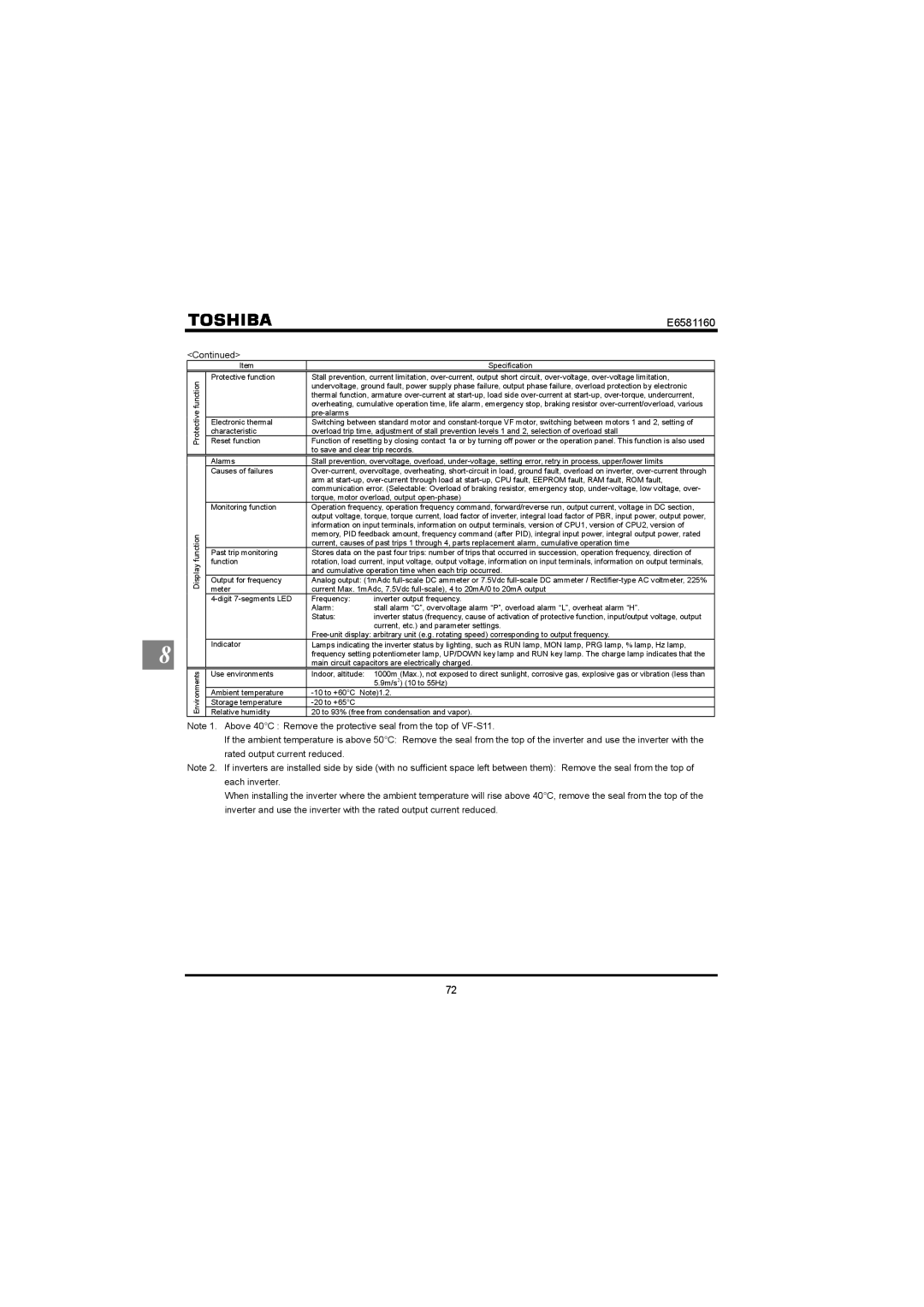
|
|
|
|
|
| E6581160 | |
|
|
| <Continued> |
|
|
| |
|
|
|
| Item |
| Specification |
|
|
|
| function | Protective function | Stall prevention, current limitation, |
| |
|
|
|
| overheating, cumulative operation time, life alarm, emergency stop, braking resistor |
| ||
|
|
|
|
| undervoltage, ground fault, power supply phase failure, output phase failure, overload protection by electronic |
| |
|
|
|
|
| thermal function, armature |
| |
|
|
| Protective |
|
|
| |
|
|
| Reset function | Function of resetting by closing contact 1a or by turning off power or the operation panel. This function is also used |
| ||
|
|
|
| Electronic thermal | Switching between standard motor and |
| |
|
|
|
| characteristic | overload trip time, adjustment of stall prevention levels 1 and 2, selection of overload stall |
| |
|
|
|
|
| to save and clear trip records. |
| |
|
|
|
| Alarms | Stall prevention, overvoltage, overload, |
| |
|
|
|
| Causes of failures |
| ||
|
|
|
|
| arm at |
| |
|
|
|
|
| communication error. (Selectable: Overload of braking resistor, emergency stop, |
| |
|
|
|
|
| torque, motor overload, output |
| |
|
|
|
| Monitoring function | Operation frequency, operation frequency command, forward/reverse run, output current, voltage in DC section, |
| |
|
|
|
|
| output voltage, torque, torque current, load factor of inverter, integral load factor of PBR, input power, output power, |
| |
|
|
|
|
| information on input terminals, information on output terminals, version of CPU1, version of CPU2, version of |
| |
|
|
| function |
| memory, PID feedback amount, frequency command (after PID), integral input power, integral output power, rated |
| |
|
|
|
| current, causes of past trips 1 through 4, parts replacement alarm, cumulative operation time |
| ||
|
|
|
|
|
| ||
|
|
|
| Past trip monitoring | Stores data on the past four trips: number of trips that occurred in succession, operation frequency, direction of |
| |
|
|
| Display | function | rotation, load current, input voltage, output voltage, information on input terminals, information on output terminals, |
| |
|
|
|
| and cumulative operation time when each trip occurred. |
| ||
|
|
|
| Output for frequency | Analog output: (1mAdc |
| |
|
|
|
| meter | current Max. 1mAdc, 7.5Vdc |
| |
|
|
|
| Frequency: | inverter output frequency. |
| |
|
|
|
|
| Alarm: | stall alarm “C”, overvoltage alarm “P”, overload alarm “L”, overheat alarm “H”. |
|
|
|
|
|
| Status: | inverter status (frequency, cause of activation of protective function, input/output voltage, output |
|
|
|
|
|
|
| current, etc.) and parameter settings. |
|
|
|
|
|
|
| ||
8 |
|
|
| Indicator | Lamps indicating the inverter status by lighting, such as RUN lamp, MON lamp, PRG lamp, % lamp, Hz lamp, |
| |
|
|
|
| frequency setting potentiometer lamp, UP/DOWN key lamp and RUN key lamp. The charge lamp indicates that the |
| ||
|
|
|
| main circuit capacitors are electrically charged. |
| ||
|
|
| Environments | Use environments | Indoor, altitude: | 1000m (Max.), not exposed to direct sunlight, corrosive gas, explosive gas or vibration (less than |
|
|
|
| Relative humidity | 20 to 93% (free from condensation and vapor). |
| ||
|
|
|
|
|
| 5.9m/s2) (10 to 55Hz) |
|
|
|
|
| Ambient temperature |
| ||
|
|
|
| Storage temperature |
|
| |
|
|
|
|
|
|
|
|
Note 1. Above 40°C : Remove the protective seal from the top of
If the ambient temperature is above 50°C: Remove the seal from the top of the inverter and use the inverter with the rated output current reduced.
Note 2. If inverters are installed side by side (with no sufficient space left between them): Remove the seal from the top of each inverter.
When installing the inverter where the ambient temperature will rise above 40°C, remove the seal from the top of the inverter and use the inverter with the rated output current reduced.
72
